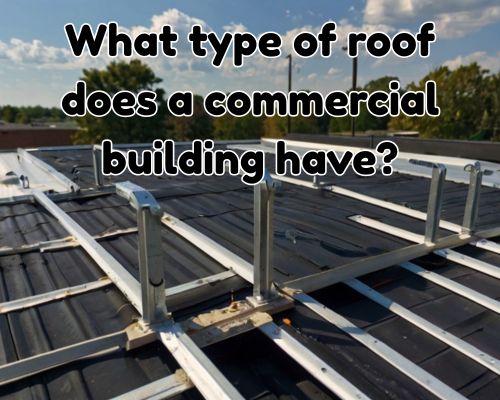If you’ve ever gazed at the sprawling skyline of New Jersey, from the industrial zones of Newark to the retail corridors of Jersey City, you might notice a pattern in commercial architecture: the roofs. But what type of roof does a commercial building have, and why does it matter—especially in a location like New Jersey, where weather, zoning, and building codes are anything but generic?

This guide offers clarity, whether you’re a property developer, facility manager, or business owner. With Charles Jimerson of CJ Commercial Roofing NJ, we’ll explore the most common commercial roofing systems, key materials used, climate considerations, and regional best practices—all while factoring in New Jersey’s unique commercial real estate landscape.
The Most Common Commercial Roofing Types in New Jersey
In New Jersey, commercial buildings predominantly feature flat or low-slope roofing systems. This design is not arbitrary; it’s a calculated choice based on practicality, cost-efficiency, and compliance with state and municipal building codes. Here’s a breakdown of the most prevalent types:
1. Built-Up Roofing (BUR)
Built-Up Roofing, often referred to as “tar and gravel” roofing, is one of the oldest and most reliable systems used in commercial roofing. In New Jersey, this roofing system remains popular in industrial parks in Elizabeth, manufacturing facilities in Paterson, and other zones with larger structures.
Key benefits:
- Excellent waterproofing
- Fire resistance
- Thermal insulation with multiple layers
LSI Keywords: multi-ply roofing, asphalt roofing, gravel roof, commercial insulation
2. Modified Bitumen Roofing
This roofing type evolved from BUR but adds polymer-modified materials, improving durability and elasticity. It’s particularly valuable in New Jersey’s climate zone 4A, which experiences freezing winters and humid summers.
Commonly seen in: Schools, hospitals, and multi-unit office complexes across Trenton, New Brunswick, and Parsippany.
Advantages:
- High tensile strength
- Ease of repair
- Good performance under temperature fluctuations
LSI Keywords: torch-down roofing, SBS modified roofing, APP membrane
3. EPDM (Ethylene Propylene Diene Monomer)
If you’re scanning the rooftops of commercial warehouses in Camden or Cherry Hill, chances are, you’re looking at an EPDM roof. Known for its rubber membrane, EPDM is a go-to option in New Jersey due to its UV resistance and cost-effectiveness.
Why it’s ideal:
- Long lifespan (20-30 years)
- Excellent for flat roofs
- Flexible in freeze-thaw cycles
Salient entities: Firestone, Carlisle SynTec, rubber roofing, single-ply membrane
4. TPO (Thermoplastic Polyolefin)
TPO roofing is gaining momentum in eco-conscious developments in cities like Hoboken and Princeton. The bright white surface reflects sunlight, making it energy-efficient, which is especially valued in LEED-certified buildings.
Top perks:
- High solar reflectivity
- Seam-welded for watertight security
- Mold-resistant
LSI Keywords: cool roof, energy-efficient roofing, white membrane roof, UV-reflective
5. PVC Roofing
Used in restaurants, shopping centers, and retail plazas like those in Paramus, PVC roofing offers exceptional chemical resistance and durability.
Best for:
- Commercial kitchens (grease resistance)
- Medical facilities
- Commercial retail zones with rooftop HVAC
Salient entities: Duro-Last, IB Roof Systems, polyvinyl chloride roofing
Why Roof Type Matters in New Jersey
Beyond structural function, the type of commercial roof impacts:
🌀 Weather Resistance
With New Jersey prone to Nor’easters, heavy snowfall, and coastal storms, roofing systems must endure wind loads and precipitation. Materials like EPDM and TPO offer flexibility under pressure and water resistance.
🏙️ Zoning & Code Compliance
Each municipality—be it Bayonne or Atlantic City—has specific codes regarding load requirements, drainage systems, and fire ratings. Choosing the wrong roofing type can lead to non-compliance and legal headaches.
🌱 Energy Efficiency
As New Jersey’s Energy Master Plan pushes toward carbon neutrality by 2050, building owners are incentivized to adopt energy-efficient roofing, like TPO and green roofs. These options not only reduce HVAC costs but may qualify for NJ Clean Energy Program incentives.
Cost Considerations: What’s the Price Tag?
On average, commercial roofing installation in New Jersey ranges between $5 to $12 per square foot, depending on materials and complexity.
| Roof Type | Avg. Cost (per sq ft) | Lifespan |
|---|---|---|
| BUR | $5 – $9 | 20–30 yrs |
| Modified Bitumen | $4 – $8 | 15–25 yrs |
| EPDM | $4 – $7 | 20–30 yrs |
| TPO | $5 – $8 | 20–30 yrs |
| PVC | $6 – $10 | 20–30 yrs |
Note: Always consult a licensed commercial roofer in New Jersey for accurate estimates tailored to your building’s specs.
Commercial Roofing Trends in New Jersey
1. Green Roofing Initiatives
Urban hubs like Newark and Jersey City are experimenting with vegetative roof systems that provide insulation, reduce runoff, and create aesthetic value. Green roofs are particularly effective when combined with stormwater management mandates.
2. Solar-Ready Roofing
With New Jersey being a top solar adopter, many commercial roofs are now designed to support solar panel integration. EPDM and TPO systems offer a strong base for photovoltaic arrays.
3. Drone Roof Inspections
Commercial roofing companies in Edison and Morristown are leveraging drone technology for faster, safer inspections—essential for maintenance planning and post-storm damage assessments.
Choosing the Right Roofing Contractor in New Jersey
Look for licensed commercial roofing contractors with:
- Proven experience in local commercial projects
- Up-to-date insurance and warranties
- Familiarity with NJ building codes, see https://cjcommercialroofingnj.com/
- References from businesses in cities like Hackensack, Woodbridge, or Freehold
Trusted names like Pfister Roofing (in Paterson), Union Roofing, or Nations Roof have been prominent in delivering high-quality commercial solutions across the state.
Final Thoughts
So, what type of roof does a commercial building have in New Jersey? The answer isn’t singular—it depends on budget, building type, local climate, and regulatory constraints. From flat EPDM membranes on warehouses to white TPO roofs on energy-conscious office parks, New Jersey’s commercial buildings showcase a strategic blend of function, durability, and efficiency.
If you’re planning a commercial project or retrofitting an existing property, consult a local commercial roofer who understands New Jersey’s unique construction environment. The right roofing system isn’t just an overhead necessity—it’s a long-term investment in safety, compliance, and sustainability.